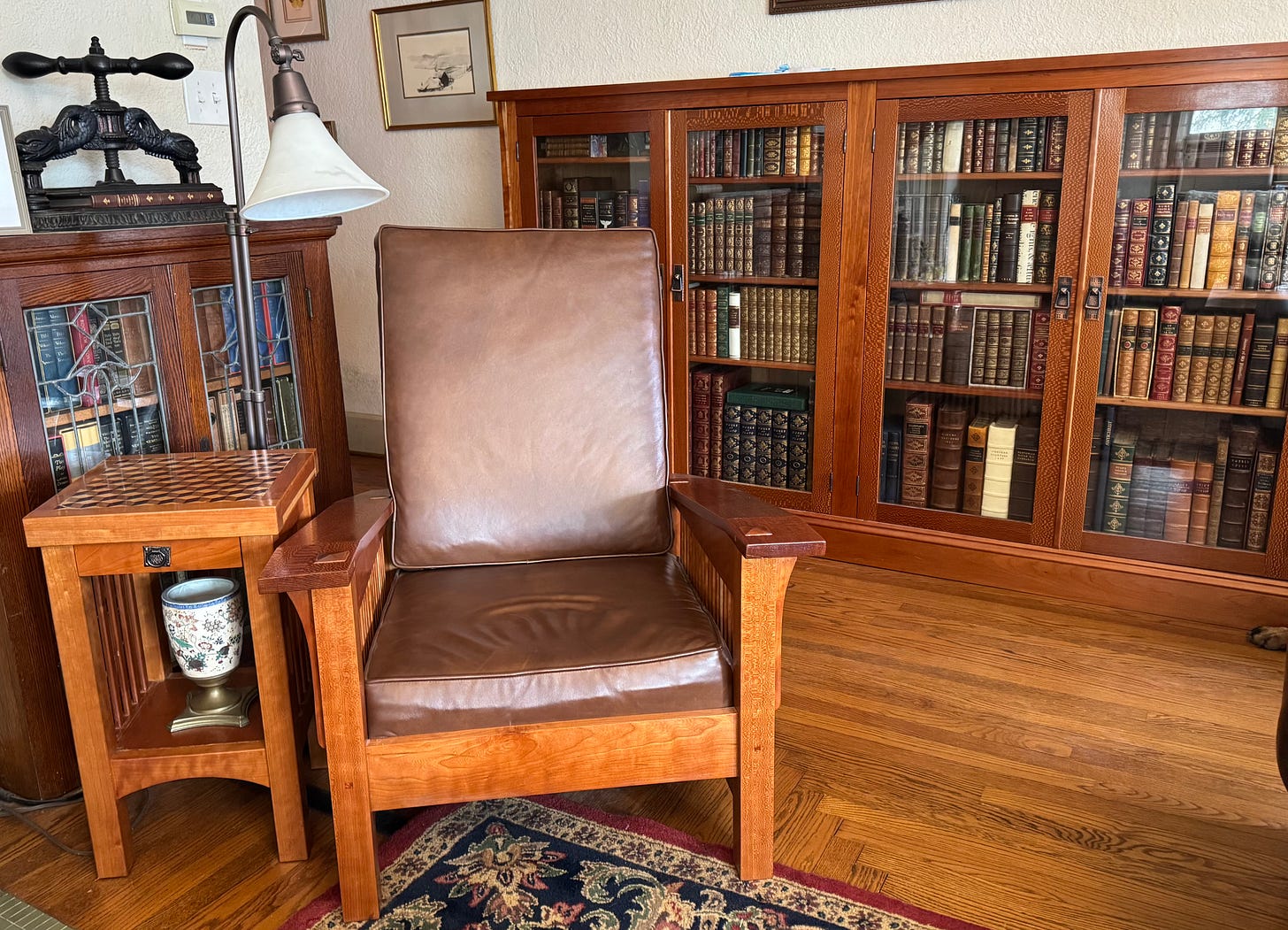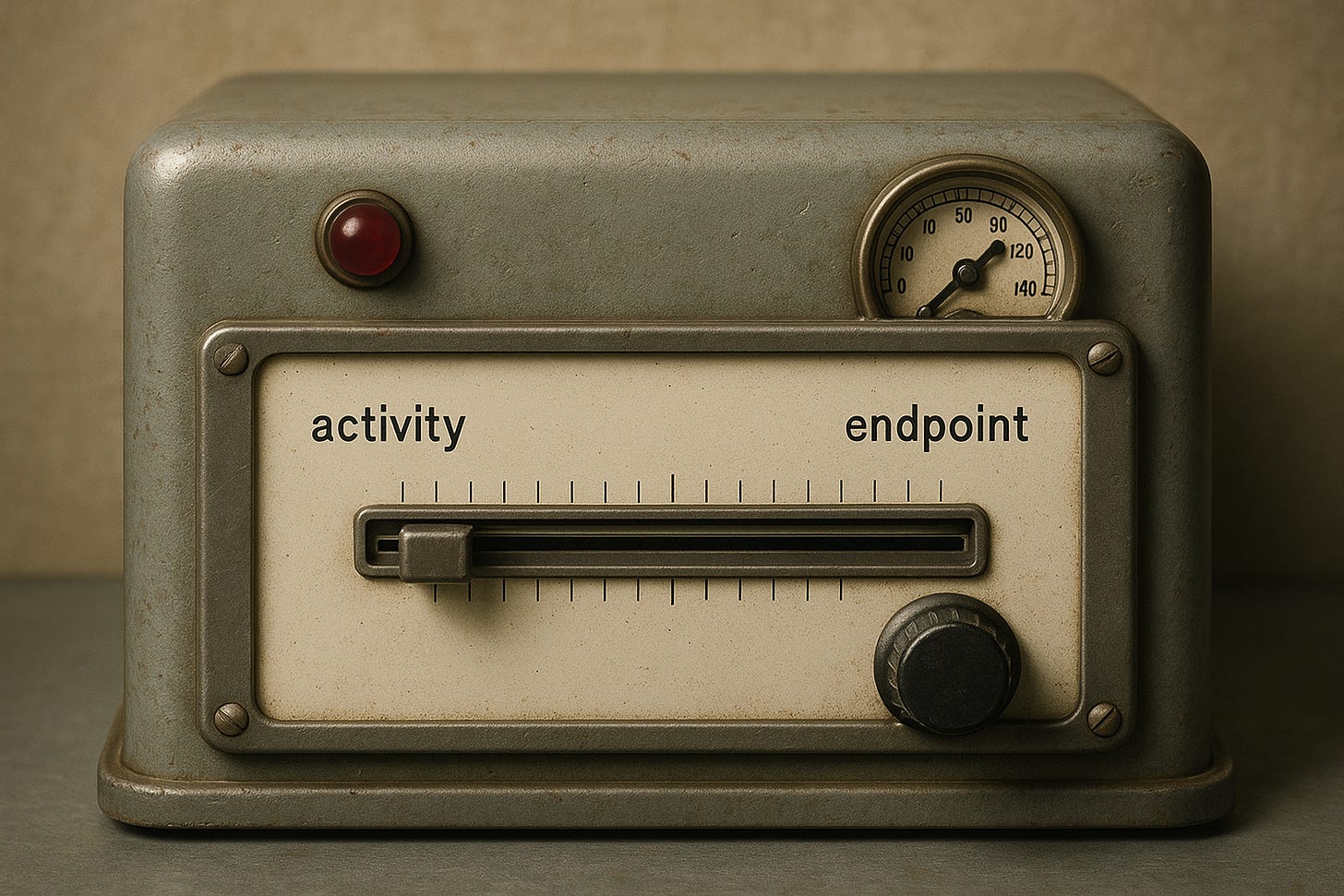Every activity has a termination point. You finish the book, the game is over, it’s graduation day, we get to our destination, the coffee’s gone, the final encore has been played, the workday has ended. Some things we do because we only want the outcome; all we want is to get to termination. Other things, even activities that have a natural conclusion, it’s the process that matters. Sometimes there’s a sliding scale—you want to get to the end, but you want the journey too. It’s easy to get confused about exactly what’s valuable and why, so naturally all this made me think about what Albert Camus says about Sisyphus.
Let’s put activities into three different bins.
Getting to the end is all that matters
Assembling Ikea furniture
Commercial flying
Eating fast food
Mowing the lawn
Doing laundry
Saving for retirement
There’s two senses of “the end of an activity” that we need to disambiguate. One is the desired object or goal of an activity. In this sense the end of assembling Ikea furniture is to have a functional bookcase when you are done. The end of commercial flying is to arrive at your destination. The end of eating fast food is getting cheap calories down the hatch. The end of mowing the lawn is to have shorter grass.
The second sense of “the end of an activity” is the terminal state of the activity. It is when you are finished doing the thing. In the second sense, the end of eating fast food is when the food is gone, the end of saving for retirement is when you retire and start spending your savings, and the end of doing laundry is when it is folded and put away. When getting to the end is all that matters, you just want the project to be over. Like commercial flying—it’s misery and all anyone wants is to get where they are going and escape the sardine can from hell.
In these cases, all that you care about is achieving the goal and therefore getting to the terminal state in the most efficient way possible. Your yard is hilly with a lot of trees and you don’t enjoy yard work. So you plot out the best path for mowing the grass to get it done and return to things you actually want to do. All perfectly reasonable. With other activities,
Participating in the process is all that matters
Reading a book
Watching a movie
Going to a concert
Being on vacation
Going on a bicycle ride
Playing small-stakes poker with friends
“Success” is barely meaningful in these contexts. Often you don’t even want to get to the end. The first time I saw The National in concert, on their Trouble Will Find Me tour, I remember turning to my wife at the end of the show and saying, “I would watch that all over again starting now.” How many people never wanted to leave Hogwarts or Narnia or Middle Earth? We don’t want those stories to end. Maybe that’s another feature of the sublime—we wish to remain in the state of amazement forever.
Even with activities that have a natural conclusion, like a bike ride, you don’t really care about the ostensible goal. Bike rides end, either you’ve done a loop and you’re back at the start, or it’s a one-way and you’re at the endpoint. If you ride a loop, you obviously not doing it in order to get home; you started at home. You could have just stayed there with no effort. Even a one-way ride: why not just drive? Or take an Uber? Cycling is hardly the most efficient way to travel. The obvious answer is because it’s the activity itself you enjoy, not its terminus. You’re in it for the ride, not the destination.
Similarly, some friends and I play poker once a month. Since they are mostly mathematicians and psychologists I’m fortunate to break even. But it’s small-stakes stuff, and if someone loses $20 or wins $20, nobody really cares. We’re just there to have a couple of beers and a few laughs and no one’s mortgage payment is on the line. The point of friendly poker is the activity, not any kind of end state.
Things you do because you want the end result, but there is also value in the process
Making a nice dinner
Flying first class
Making love
Going to college
Hunting and fishing
Building your own furniture from scratch
I needed a bookcase, wanted a nice reading chair, and thought a little table good for holding a coffee mug and the book du jour would be nice. So I made the Morris chair, the little table to the left, and the large bookcase to the right. I also bound most of the books in that bookcase. I’m not bragging about it—when I look at my own work my eye is instinctively drawn to imperfections and things I could have done better. Plus, furniture-making and bookbinding is a lot of work. So why didn’t I just buy something pre-made, or an Ikea piece I could easily slap together? Because only a small part of the joy is in the owning; most of the pleasure is in the making and the satisfaction of self-sufficiency.
Much the same is true of people who like to hunt or fish. You can always go down to the grocery store and pick up some trout filets, so why buy expensive fishing gear just so you can stand in a freezing stream all day? Izaak Walton gave the answer in 1653:
No life, my honest scholar, no life so happy and so pleasant as the life of a well-governed angler; for when the lawyer is swallowed up with business, and the statesman is preventing or contriving plots, then we sit on cowslip-banks, hear the birds sing, and possess ourselves in as much quietness as these silent silver streams, which we now see glide so quietly by us. Indeed, my good scholar, we may say of angling, as Dr. Boteler said of strawberries, ‘Doubtless God could have made a better berry, but doubtless God never did’; and so, if I might be judge, God never did make a more calm, quiet, innocent recreation than angling. (The Compleat Angler, ch. 5)
No doubt Walton enjoyed a nice fish dinner, but most of the value he found was in the process of his bucolic pastime.
All the items in this category lie on a continuum, and we can imagine a slider that shifts how much value we find in the activity itself vs. how much we find in the endpoint of the activity. When making a fancy meal we can move that slider more in the direction of “crafting dishes for my family is the best part” or push it in the direction of “I can’t wait to quit slaving over a hot stove and eat.” Students too often move the slider on college to “graduation is all that matters” when 95% of the value should be “participating in the process is what’s truly important.” That’s the mistake they make.
This classification has given me insight into something that has always puzzled me about Camus. He argues that our lives are absurd because we all want a transcendent meaning for our lives, a justification for why we are here, a purpose. Then we’re confronted with an impersonal universe that fails to provide any of that. The absurd, he thinks, is that conflict between what we want and what we’re getting.1
So why keep going? Normally we try to get out of doing things that have no value or purpose—imagine being chained to a desk filling out forms and writing reports that will never be read. We want to quit useless, meaningless activities. If life is meaningless, then why not quit that? What’s the point in keeping on living? This reasoning is why Camus declares that the problem of suicide is the most fundamental philosophical problem.
His answer is that instead of despair and suicide we can choose to live the absurd life: a life of revolt, freedom, and passion. The first two I kind of get; if there’s no greater meaning or purpose to your life, then you’re liberated to revolt against conventional expectations. Awareness of the dark cloud that blows from your future provides a kind of “freedom that consists in not feeling responsible.” After your death, your responsibilities all end, and that feels freeing now.
It’s the last bit, passion, that I’ve always found most mysterious. Camus calls it “the purest of joys” and that its pursuit leads to maximizing our experiences. More experiences, not “better” ones. How does that work out for Sisyphus, whom Camus characterizes as the absurd hero?
Sisyphus was the legendary first king of Corinth, and not especially famous for good decisions. First he pissed off Zeus by ratting him out to the river god Asopus after Zeus abducted Asopus’s daughter Aegina. Later, when Sisyphus went on to twice cheat Thanatos (death), the gods really dropped the hammer. They sentenced him to an eternity in the underworld, pushing a boulder up a mountain, only to have it roll back down again. Then he would repeat his task, again and again ad infinitum.
The punishment of the gods was to eternally engage in a pointless action, one that had no terminus. Sisyphus never completes his task. If getting to the end was all that mattered, then this is a terrible fate. Yet here’s Camus’s famous reconsideration:
All Sisyphus’ silent joy is contained therein. His fate belongs to him. His rock is his thing… The absurd man says yes and his effort will henceforth be unceasing… he knows himself to be the master of his days… The rock is still rolling. I leave Sisyphus at the foot of the mountain! One always finds one’s burden again. But Sisyphus teaches the higher fidelity that negates the gods and raises rocks. He too concludes that all is well. This universe henceforth without a master seems to him neither sterile nor futile. Each atom of that stone, each mineral flake of that night-filled mountain, in itself forms a world. The struggle itself toward the heights is enough to fill a man’s heart. One must imagine Sisyphus happy.
I think what’s going on is this: Camus imagines Sisyphus moving the value slider all the way to the left, so that participating in the process is all that matters. His rock is his thing; the value is completely in the struggle. He no longer cares about any kind of end result; pushing that boulder is just what he does. He’s not resigned to his fate—instead he embraces it. That is his passion. Then Sisyphus can give the finger to the gods with a smile on his face.
Just maybe there is something we can learn here about revaluing what matters to us, that we too might have the passion of the condemned.
Thomas Nagel famously gives a different analysis of the absurd, which is pretty interesting, but, hey, exercise for the reader.









